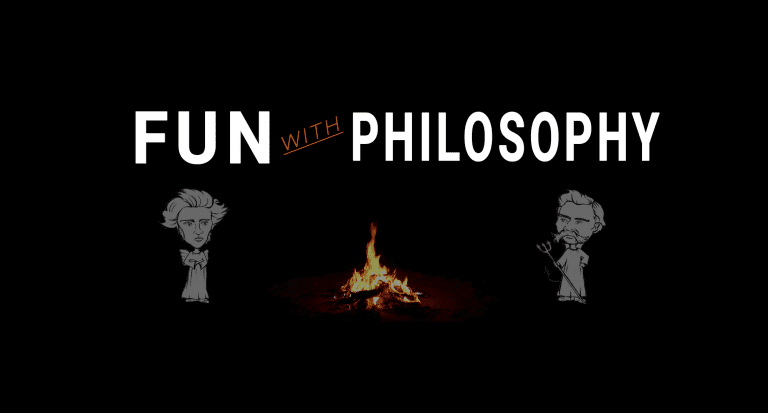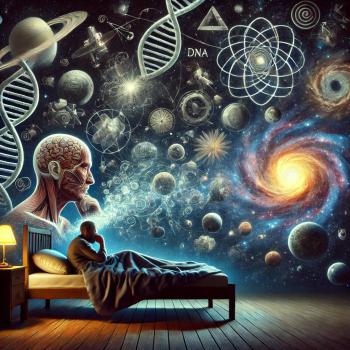
I feel like I have a soul. I don’t mean I believe I have a soul. I mean I can feel it. I feel the duality of an inner and outer world. Within my inner world, my voice is constantly speaking. During the day it appears as thoughts and speech and at night it appears as dreams.
However, I am constantly perplexed by the question, “to whom am I speaking?” I can’t be speaking to myself, because my self is the one who is speaking. It is “I” who speaks to an unknown “other”.
Am I speaking to my brain? Well, I can’t be if my brain is the one producing the self-talk, to begin with. Moreover, (1) either the brain doesn’t produce the self-talk and for some unknown reason I have a desire to speak with it; or (2) I am not speaking to my brain, but some unknown other.
The Two Worlds of Experience
I feel like I experience two worlds. The first world is my inner world. This world is private and is only known to me. I have a subjective experience within myself that involves a subject and some “other” that I can only refer to as “other” (for now). It is who I speak to when I speak to myself.
The other world is the outer world, which is experienced by my outer self. It is the experience of my physical self within the objective world. My outer self and inner self only seem distinguishable based upon the type of interaction that is occurring (e.g. objective or subjective).
However, neither my inner world nor my outer world is acting independently. Instead, at times, there is interaction. Sometimes, I think on purpose. I think on purpose when I want to learn something. In learning, I use my temporal lobe to remember and comprehend what I am learning. l use my frontal lobe to reason. All of which are necessary for learning. When I am reading, I am speaking to my brain; specifically, I am sending information to whichever area of the brain needs the information (for memorization, comprehension, reasoning, etc.).
But what about those times when I am not intentionally speaking to myself? For example, when I am performing a mindless activity and I suddenly realize that I have been talking to myself or talking out loud to someone who is not there.
Science and the Denial of the Soul
Science has made great breakthroughs in neuroscience over the last 20 years. One such breakthrough is the ability to reproduce the sensations of the conscious brain; for example, the out of body experience that people claim to have when they have died and come back to life (NDE). As a result of their study, they have concluded that the NDE is an illusion the brain creates when it is shutting down. In fact, many neuroscientists believe that a person is not really dead when they die. They claim the brain takes time to shut down and so the individual may still have some experience until that happens (up to 72 hours). This is when the brain has an NDE.
However, it is important to understand that just because science can replicate a particular experience does not in and of itself negate the experience the individual had. For example, if the brain is used in “soul” generation then it would make sense that manipulating the right portions of the brain might reconstruct a similar experience. However, that in no way can explain the whole experience.
Problems with the Soul
If I am being honest, then I have to admit that there are some philosophical problems with my argument. If It is true that I have a soul, then where does it come from? I admit that I don’t think God places a soul into every human. How can I know that every human has a soul? Even if another human seemingly experiences themselves to the extent that I do, I still can’t be certain that it is exactly the same because it is certainly possible that it is the same only in appearance, but in reality, might be functionally different.
But…what if God created the brain as a soul generating organ? That its primary purpose is to generate and nurture this inner world (where the soul resides). If this is true it would seemingly answer every question that opposes it. Just as a woman’s physical body creates the outer world of a human so too does that human form (or the brain specifically) create the inner world of the soul. Just as the two unite at birth so too do the two separate at death.
If God did in fact design the brain to function this way, then we can know with certainty that everyone experiences the soul the same – assuming the aspects of the brain responsible for this function are designed the same and working as normal.
The question that this perspective generates is, wouldn’t it be better for God to have just created a world for the soul to exist in, why create this outer and inner world for a short time and then a painful separation of the two?
Of course, I cannot know the answer to this question, but I suspect that there is something about this world that makes it necessary for the soul to reside in a physical body. Maybe this world is a training ground for the soul. That when we experience love, for example, it’s not real love, but only a small piece of what love actually is.
As I reflect on the idea of the soul, I can’t help but stand in awe of its beauty. The soul is what gives humanity its personality and its purpose. It’s that link that binds the human being to the divine. It’s what helps us understand that we are not alone and that we don’t have to face this world by ourselves. It is the proof that God has installed something within us that shows us that there is more to this life than the reality we currently exist in. That a life well lived, with purpose and intention will be a soul deserving of eternal bliss.
“Fun with Philosophy” covers fireside topics that are of interest to me. Get a front-row seat into my brain with this series.


















